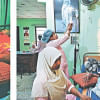A ray of hope for cancer patients

Kumudini Welfare Trust, one of the country's biggest charitable organisations dedicatedly working for medical services, is now going to set up a hospital in Narayanganj with a special focus on cancer treatment.
The new branch of the hospital will not only provide treatment to cancer patients but also conduct research on cancer diseases and palliative care.
These details were disclosed at an international cancer and palliative service conference held at Kumudini Welfare Trust campus in Mirzapur, Tangail yesterday.
Kumudini Hospital in Tangail is one of the first hospitals in the country which has been treating cancer patients using radiotherapy devices since 1948.
"We believe in the dignified death of human beings. This hospital has all kinds of arrangements for this. A cancer hospital is being set up in Narayanganj on behalf of Kumudini Welfare Trust and they have taken special initiatives for cancer research," said Rajiv Prasad Shaha, managing director of the trust.
The two-day conference was jointly organised by Kumudini Welfare Trust, Simmons University and Massachusetts General Hospital. About 300 cancer and palliative care specialists from home and abroad participated in the conference.
On the first day of the conference, several sessions highlighted the foresight of Ranada Prasad Shaha, founder of Kumudini Welfare Trust, in the treatment of cancer.
At the first session, Bimalangshu Dey, an oncologist of Massachusetts General Hospital, said it has become very essential for Bangladesh to ensure cancer treatment and palliative care for cancer patients.
"If cancer were not treated and palliative care not provided, Bangladesh would not achieve many of its goals. It is good news that we have started working together," he said.
At the inaugural ceremony, Kumudini Welfare Trust Director Srimati Saha said, "If all the people are with the Kumudini Welfare Trust, it will be able to make remarkable achievements."
Speaking as chief guest, Rokeya Sultana, state minister for health and family welfare, stressed palliative care as it provides relief to cancer patients before their death.
Prof Nizamuddin Ahmed, founder of the palliative care department of Bangabandhu Sheikh Mujib Medical University, said the concept of palliative care is still not clear to many people.
"The purpose of palliative service will not be achieved if communities are not involved. The approach should be done from the public health perspective," he said.
Only 14 percent of the world's population gets palliative care. In poor countries like Bangladesh, this rate is much lower, said Shefali Rani Sarkar, vice principal of Kumudini Nursing College.
Arun Mahadevan, a delegate from the US, explained how radiotherapy can be used for palliative care.
Kumudini Hospital in Tangail is one of the first hospitals in the country which has been treating cancer patients using radiotherapy devices since 1948, said Prof Md Abdul Halim, principal, Kumudini Women's Medical College.
A total of six sessions were held on the first day of the conference.

 For all latest news, follow The Daily Star's Google News channel.
For all latest news, follow The Daily Star's Google News channel. 








Comments